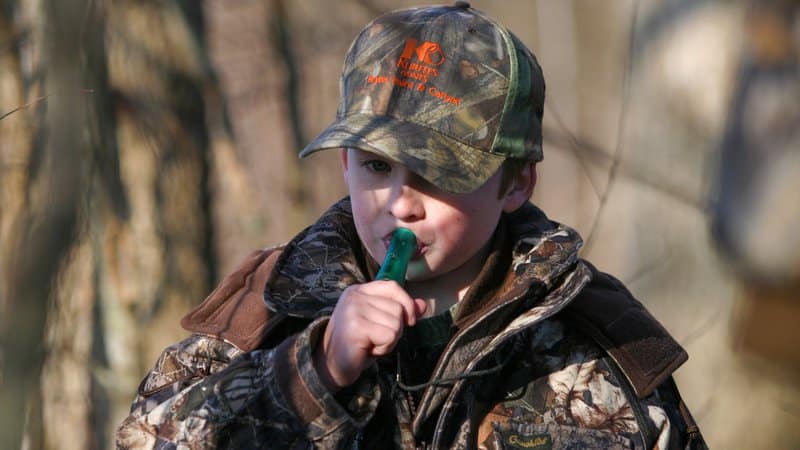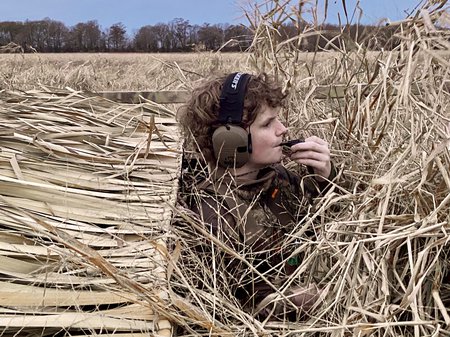Duck calls that won’t scare the decoys
ON 12-15-2021

Dec. 15, 2021
Randy Zellers
Assistant Chief of Communications
LITTLE ROCK — Most groups of waterfowl hunters will automatically yield to one or two callers who have the experience and knack for reading the birds and knowing exactly what sounds will give the best odds at drawing them in for a closer look at your decoys. But for beginners, sitting still in the blind just waiting for someone to call the shot can get as stale as a local duck in mid-December. Keep the kids, and newcomers, interested by letting them be part of the chorus. Not only will they feel like they’re more of a hunter, the added sounds can be the difference in selling your spread to ducks that have grown tired of a single lonesome hen calling among a few dozen decoys. Here are a couple of nearly failsafe options to hand to the greenhorns when chasing greenheads.
Whistle While You Work
It’s probably the cheapest call you’ll ever buy, but the pintail whistle is a mainstay on nearly every hunter’s lanyard. Not only can it imitate the rolling trill of a sprig, it can copy the peep of a green-winged teal drake, the low-hi-low toot of a wigeon or the buzzing “greeb” of a mallard drake with very little practice.
Start newcomers off with the teal. All it requires is a short blast of air with your finger covering half of the exhaust to get the right pitch. After that, teach them the basics of the mallard drake. Anyone who’s blown a kazoo can master this sound in minutes.
Although not much more difficult, the wigeon and pintail calls can be mastered quickly, but offering too many options at once might intimidate a newcomer, and for the majority of duck hunting in The Natural State, greenwings and greenheads are going to be the most highly prized targets.

‘Dat Gadwall Sound
It might sound like the worst mallard call you’ve ever heard, but the “dat-dat-dat” sound of the gadwall is right at home in the marsh. More mallard hunts in fields and potholes have been saved by the gray duck than most hunters will admit. Although they’re one of those “other” ducks, gadwalls offer great sport and are just as good as table fare, although they tend to run slightly smaller than greenheads. They decoy readily to groups of mallards and respond well to a hen mallard call, but the drakes’ buzz can be mimicked easily with a gadwall call and can add realism to your spread, even when you’re calling at other birds on the wing.
Shaky Hands
The feed chuckle is probably the sound most novice hunters want to imitate the most, and it’s an essential skill to learn, although it does get a bit overused because it just has that cool factor. Thanks to some ingenious call manufacturers, there is a solution for the young hunter who still gets tongue-tied when trying to chuckle down a duck. These bellows-enhanced calls are unwieldy to try and manipulate while working another call with your mouth, but they’re a good way to offer a newcomer a way to participate in the hunt.
Mingle With Singles
If they already have a duck call, but haven’t quite mastered the cadence of calling strings, have them keep it simple with an occasional single quack pointed to the side of the blind. Just tell them not to call until you point to them and to try to keep the volume a little lower than the main caller. Focus their calls when the ducks are facing away or to the side of their sound. You may feel like a band conductor calling and pointing to add the accompanying sounds, but it will give new callers a chance to practice on the big call and start to learn that when you call is just as important as the sound you make.
Recent News

Arkansas Wildlife Weekly Fishing Report
Jul. 10, 2025

Lonoke aquaculturist named to AGFC
Jul. 10, 2025
Subscribe to Our Weekly Newsletter E-mails
Don’t miss another issue. Sign up now to receive the AGFC Wildlife Weekly Newsletter in your mailbox every Wednesday afternoon (Waterfowl Reports are published weekly during waterfowl season and periodically outside the season). Fishing Reports arrive on Thursdays. Fill in the following fields and hit submit. Thanks, and welcome!
